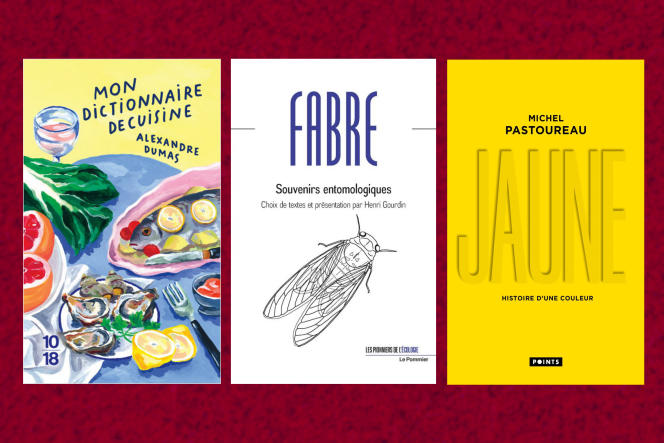“My cooking dictionary”, by Alexandre Dumas, preface Jean-Claude Zylberstein, 10/18, 680 p., €11.50.
“Entomological memories”, by Jean-Henri Fabre, anthology by Henri Gourdin, Le Pommier, “The pioneers of ecology”, 330 p., €14.
“Yellow”, by Michel Pastoureau, Points, 242 p., €9.90.
Ogre in love, glutton for adventures, eager for space and hunting, it went without saying that Alexandre Dumas senior (1802-1870) was also an eminent gastronome. Last stand of a very ill Dumas, written in Brittany in 1869 and published posthumously, in 1873, under the supervision of Leconte de Lisle, Anatole France and the cook Vuillemot, My cooking dictionary summarizes the epic of an elite palace, the taste saga of a man who is excruciatingly alive.
of“slaughtered” to “vol-au-vent”, Passing by “toad”, “bone” Where “sandwich”, Dumas concocts starters that are not just pure recipes, but also historical anecdotes, personal impressions or technical advice (” burn “). If some of them take on the appearance of a treaty (” calf “, ” chicken “), others have the conciseness of a scathing judgment (“lobster”). The reader’s curiosity will, of course, not focus on the unavoidable but on the improbable, such as the” eagle “ with fibrous meat, the“donkey” tasty or the exquisite brains of “nightingale”. The reader is advised not to embark on the realization of the “squale crisp” and its “fifteen livers of young sharks”. the kitchen dictionary de Dumas not being, in fact, a manual, but the book of a seated dreamer, where reading is worth tasting, and meditation digestion.
To follow the entries well, there is not a single insect in Dumas’ compendium. But, culinary habits evolving under the effect of ecological emergencies, we were kind enough to let us know that the gratin of grasshoppers or the soup of locusts risked imposing themselves. It is therefore important to have the card presented to you, with the Entomological memories, of the Southern Jean-Henri Fabre (1823-1915). Published by Delagrave between 1879 and 1907, joining a colossal work of republican pedagogue and all-out popularizer, they constitute the chronicle of a life of descents into the teeming, ingenious and tireless world of the insect king. The choice of chef Henri Gourdin (who also publishes, with the same publisher, a biography of Fabre, The Inimitable Observer, 276 pages, 21 euros, digital 15 euros) therefore offers us, in one service: the Languedoc sphex and its fatal sting, the black-bellied tarantula, the beetle wheelbarrowing its dung pill and brooding its larva. Armed with an intuition that the authors of the film will later find Microcosmos (1996), Fabre, an immense writer, has a genius for balancing the anthropomorphic framework (the bustle of insects described as a Provençal market, the insect trying to track down its prey like a poacher) and scientific analysis.
You have 15.41% of this article left to read. The following is for subscribers only.
We would like to thank the author of this short article for this amazing web content
Alexandre Dumas, Jean-Henri Fabre, Michel Pastoureau: the “pocket” chronicle of François Angelier
Check out our social media accounts and also other pages related to themhttps://nimblespirit.com/related-pages/

